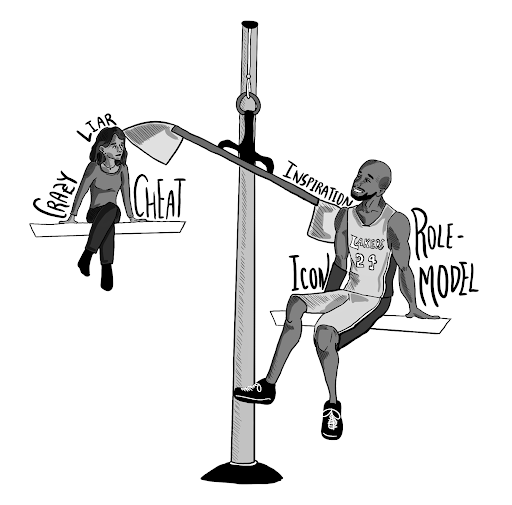Kobe’s death has unveiled society’s impermissible double standard when judging celebrities
March, 2020
Kobe Bryant’s death on January 26, 2020 came as a shock to the public. Twitter became a platform for the hundreds to express their devastation over his passing. Soon after his death, a retweet of an article relating to Bryant’s rape allegations in 2016 from The Washington Post reporter Felicia Sonmez led to a wave of hatred throughout the platform. Kobe fans began to threaten Sonmez’s life and her inbox was filled with hate. This incident brought up the question of whether or not the comments were warranted towards Sonmez or whether the negative aspects of Bryant’s life should’ve gone ignored.
When Sonmez received hate for retweeting the article, she deleted her retweet immediately. But she continued to defend herself and her actions, later stating that “Any public figure is worth remembering in their totality, even if that public figure is beloved and that totality upsetting.” This statement completely captures the essence of Bryant’s death, a man who’s mainly remembered for his basketball career, rather than his rape allegations, which appear to be pushed aside by many.
Throughout his life, Bryant did great things. He was a basketball legend who related to the public; the public who fell in love with him instantly. He didn’t let this blind him and he lived a charitable life. He also raped someone. In the age of #MeToo, we tend to tread on eggshells around sexual assault, but even in the early 2000s actions like that were intolerable. While Bryant is still seen by the public as an inspirational figure, his rape allegations are an important part of his life to remember.
Everyone should be viewed in totality, both the living nor the dead. But should an exception be made for a celebrity? Someone who lives their life in the public eye, who serves as not just another citizen but a fixture that many hold dear to their heart, is an instrumental influence over how several Americans make decisions. And in order for these decisions to be made with good morals and a sound mind, these influences should be of high quality.
Bryant was idolized by America since his time at Lower Merion High School, where he won four Pennsylvania state championships. Since the beginning of his career, he was surrounded by adoring fans who immediately idolized him and plastered his posters around their bedrooms. Children and adults saw Bryant as almost having superhuman athletic abilities. He was a role model, however, his talent was far beyond any that his followers could hope to achieve. Bryant was seen more as a God than a human, and it was this detachment that validated fans to disregard Bryant’s rape allegations in 2003. Even he attempted to distance himself from the allegations, as he said that the sex was consensual all while reaching a settlement with the victim.
While Bryant definitely embodied several admirable ideals throughout his career, they do not erase the fact that he embodied some dishonorable ones too. The undeniable truth is that Bryant made the decisions that placed him in the middle of a sexual assault case, and, whether or not he actually raped a 19-year-old hotel employee, he still did something of some capacity to make the victim uncomfortable. The truth is also that Bryant was a man of charity. The two are not mutually exclusive. Rather, they exist completely independently. We cannot compare apples and oranges, just like we cannot weigh the positives and negatives aspects of Bryant’s character. We must rather decide to accept the man in full, instead of leaving out the sections of his narrative that make us feel uncomfortable.
As teenagers, students at PHS are those most impressionable to false idolization. We’re the ones who see past the bad and fixate on the good. The tragic death of Bryant should in no regard be dismissed or forgotten. However, tragedy does not swipe one’s plate clean of past errors. We will forever remember Bryant as a loving father and an inspiring basketball star, yet if we wish to remember the real Bryant, we must also remember the sides of Bryant that might not necessarily fit his role model aesthetic. Still, this multifaceted version of Bryant reminds us that nobody’s perfect, including our idols. And in a way, by allowing their mistakes to humanize them, we enable role models like Bryant to be more relatable and more impactful on our lives.